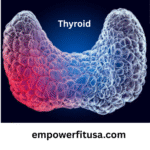If you’re trying to lose weight, feel more energized, or maintain a healthy body weight, you’ve probably heard about the importance of metabolism. But what does it really mean to boost metabolism, and how can you do it naturally?
Your metabolism is the process by which your body converts food into energy. A faster metabolism means your body burns more calories even at rest. Thankfully, you don’t need magic pills to see results—you just need smart, sustainable habits. Let’s explore the 7 daily habits that boost metabolism effectively and safely.
https://www.empowerfitusa.com/thyroid-and-metabolism-connection
1. Start Your Day with Protein
One of the simplest ways to boost metabolism is to eat a high-protein breakfast. Protein requires more energy to digest compared to carbs or fat, which means your body burns more calories through a process called the thermic effect of food (TEF).
Best Protein Sources:
-
Eggs
-
Greek yogurt
-
Cottage cheese
-
Protein smoothies
-
Turkey bacon
Studies have shown that individuals who consume protein-rich breakfasts experience increased satiety and improved metabolic function throughout the day. Adding at least 20–30 grams of protein in the morning can help your body kickstart calorie burning.
2. Stay Hydrated—Drink Cold Water
Yes, even water can boost metabolism! Drinking water temporarily raises your resting metabolic rate by 10–30% for about an hour. Cold water, in particular, forces your body to use energy to warm it up.
Hydration Tips:
-
Drink at least 8–10 glasses of water daily
-
Add lemon or cucumber for taste
-
Avoid sugary drinks that slow metabolism
Make hydration a habit—set reminders if needed. A properly hydrated body processes calories more efficiently and supports fat loss.
3. Do Strength Training
While cardio is great, strength training is crucial if you want to boost metabolism long-term. Why? Because muscle burns more calories than fat, even when you’re resting. The more lean muscle mass you build, the faster your metabolism works.
Beginner Strength Training Ideas:
-
Bodyweight exercises (squats, push-ups, lunges)
-
Dumbbell workouts
-
Resistance bands
-
Circuit training
Try to include strength training at least 3–4 times a week. As you build muscle, your resting metabolic rate will naturally increase, helping you burn more calories throughout the day.
4. Get Enough Sleep
Poor sleep is one of the most overlooked factors when trying to boost metabolism. Sleep deprivation disrupts your hormones—especially cortisol and insulin—which can slow your metabolism and increase fat storage.
Sleep Habits That Support Metabolism:
-
Aim for 7–9 hours of quality sleep
-
Stick to a regular sleep schedule
-
Avoid caffeine and screens before bed
Getting enough rest allows your body to recover, balance hormones, and maintain a healthy metabolic rate.
5. Drink Green Tea or Coffee
Caffeine and catechins (especially in green tea) can temporarily boost metabolism and enhance fat oxidation. Green tea is particularly effective because it combines caffeine with powerful antioxidants.
How to Use Them:
-
Drink 1–2 cups of green tea or black coffee daily
-
Avoid added sugars and creamers
-
Best consumed before workouts or early in the day
According to research, green tea can increase metabolic rate by 3–4%, while black coffee can improve fat-burning during physical activity.
6. Eat Smaller Meals More Frequently
While the science is mixed on meal frequency, many people find that eating smaller meals every 3–4 hours can help stabilize blood sugar levels and keep the metabolism active.
Tips for Meal Timing:
-
Don’t skip meals
-
Include protein in each snack or meal
-
Avoid large, high-carb meals that cause energy crashes
Spacing out your meals with balanced nutrition keeps your body in a more consistent calorie-burning mode. This can help you avoid the sluggish feeling after big meals and may help to boost metabolism throughout the day.
7. Stay Active All Day (Not Just at the Gym)
NEAT (Non-Exercise Activity Thermogenesis) refers to the calories you burn doing things like walking, cleaning, gardening, or even fidgeting. Boosting NEAT is one of the most underutilized ways to boost metabolism without structured workouts.
Ways to Increase Daily Activity:
-
Take the stairs instead of the elevator
-
Use a standing desk
-
Go for short walks during work breaks
-
Park further away
-
Do household chores with energy!
Staying active throughout the day keeps your metabolism humming and prevents long periods of calorie-burning slowdown.
https://www.empowerfitusa.com/keto-breakfast-ideas-for-beginners
Bonus Tip: Manage Stress
Chronic stress elevates cortisol, a hormone that can slow your metabolism and lead to fat storage—especially around the belly. If you’re serious about trying to boost metabolism, you must manage your stress effectively.
Easy Stress-Busting Habits:
-
Deep breathing exercises
-
Meditation or prayer
-
Light stretching or yoga
-
Journaling or gratitude practice
Less stress = more metabolic efficiency.
Final Thoughts
Your metabolism isn’t fixed—you can influence it every day through your lifestyle. By adopting these 7 habits that boost metabolism, you’re giving your body the tools it needs to burn more calories, balance hormones, and support sustainable weight loss.
To recap, here are the key habits:
-
Start your day with protein
-
Drink plenty of water
-
Strength train regularly
-
Prioritize sleep
-
Sip green tea or coffee
-
Eat small, frequent meals
-
Stay active all day
The best part? These habits don’t require drastic changes—they’re simple, sustainable, and highly effective. Start with one or two, and build your routine over time. Your body will thank you!
https://www.healthline.com/nutrition/10-ways-to-boost-metabolism










